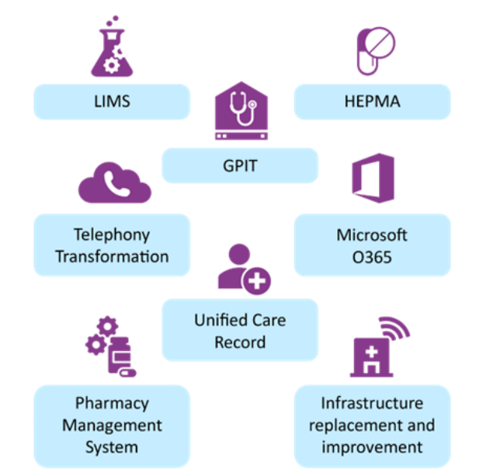A new LIMS will be implemented within the consortium Boards to free up capacity, address rising demand and deliver testing that positively affects the patient pathway.
Major investments

Funding for NHSGGC eHealth Delivery Plans is supported by Board funding, non-recurring Scottish Government strategic fund, and capital allocations.
Recovery and remobilisation of clinical services will continue to be a key challenge throughout the period of this strategy, placing additional pressures on the already challenging financial position. This strategy sets out NHSGGC's digital priorities for delivery. These will be continually reviewed and, where necessary, revised to ensure that available resources support the programmes that will make the biggest contribution to the Board's operational priorities.
The strategy will be further developed into an eHealth Delivery Plan subject to business cases and project evaluations. Requirements will be assessed against existing core clinical and business systems to ensure investment is maximised.
The robust governance structures described in this strategy will ensure that the right decisions are made in order to focus finite resources where they are most needed.

The rollout of HEPMA will be extended beyond inpatient areas, to maximise coverage and realise additional safety and efficiency benefits. Rich medicines information will be used to monitor and improve medicines practice.
A new GP IT system, under the new national framework contract will be implemented to support HSCP and Primary Care improvement plans. The Document Management System will be replaced with cloud-hosted versions to enhance workflow, work with GP2GP and contribute to our strategic citizen records initiatives.
Through the existing TrakCare system Active Clinical notes, eObs, NEWS2 (National Early Warning Score) and other opportunities to capture data electronically, we will replace traditional paper clinical notes and reduce the need for scanning paper. Maximising existing investment in TrakCare and other technologies, these are significant clinical change programmes which will be closely tracked through the benefits realisation process.
A new Pharmacy Management System will be fully integrated with HEPMA to streamline medicines supply processes. This will enable wards to order medicines electronically, removing paper and saving staff time.
Extension of Microsoft Office 365 tools will transform the way our staff work and continue to maximise the opportunities from this investment. The existing StaffNet, Shared Drives and users’ home drives will be replaced. A new app has been developed using Microsoft 365 tools and applications to support Cancer Multidisciplinary Team Meetings.
There will be a new eRostering system implemented across NHS Scotland to improve the existing rota system and processes plus providing on line access to shifts for staff.
The Unified Care Record will enhance clinical systems by aggregating citizen care data from across health and care organisations and Boards so that service users can access the information they need, regardless of setting, Board boundary or location.
Device replacement will continue in order to ensure compliance with the NIS (Network & Information Systems) Directive for cyber security and improve user experience. Network infrastructure will be refreshed to remain in support and capable of ensuring compliance, performance and reliability. Local storage and compute infrastructure will continue to be updated, with Cloud alternatives to local hosting being considered within a business case process.
